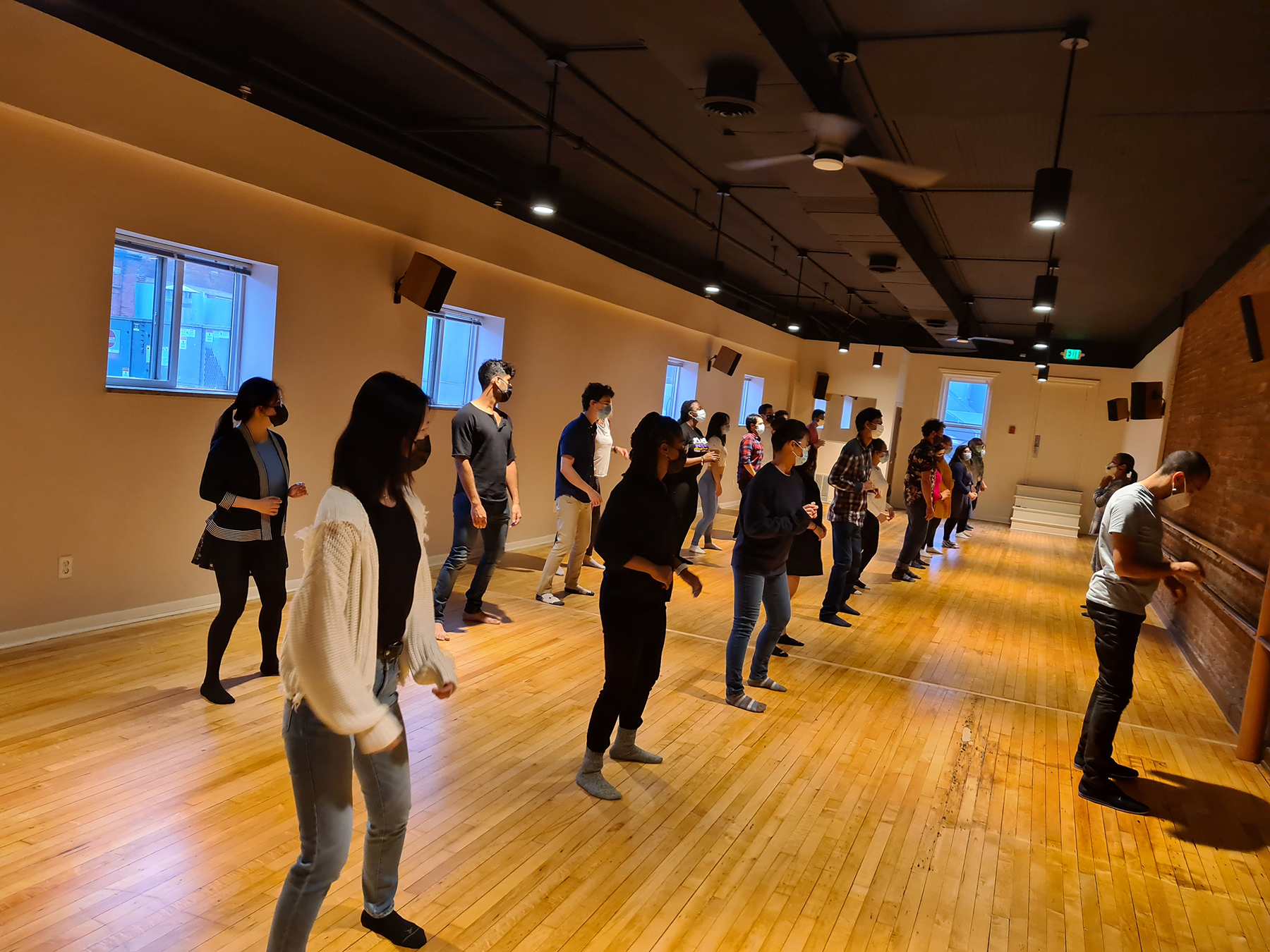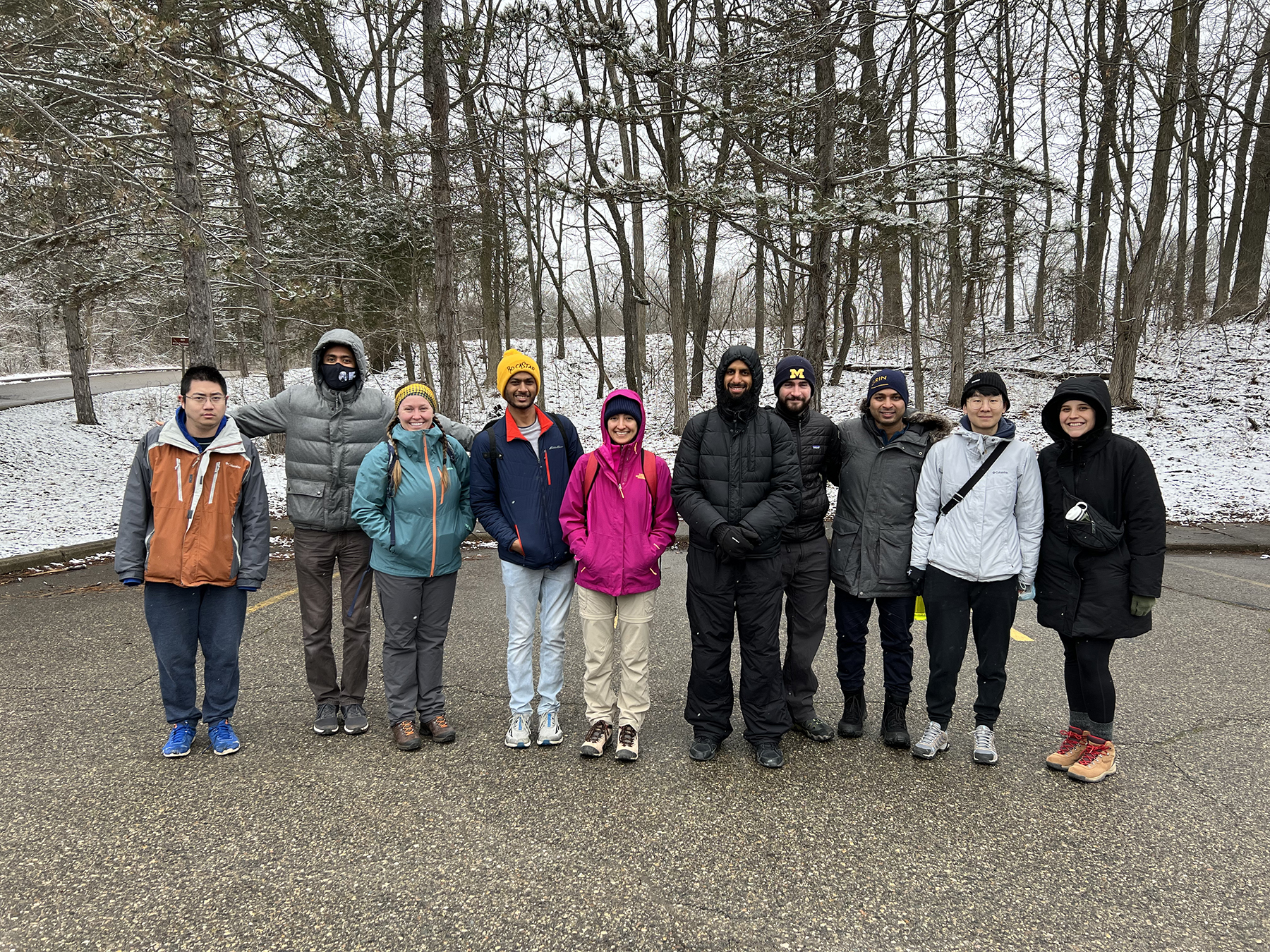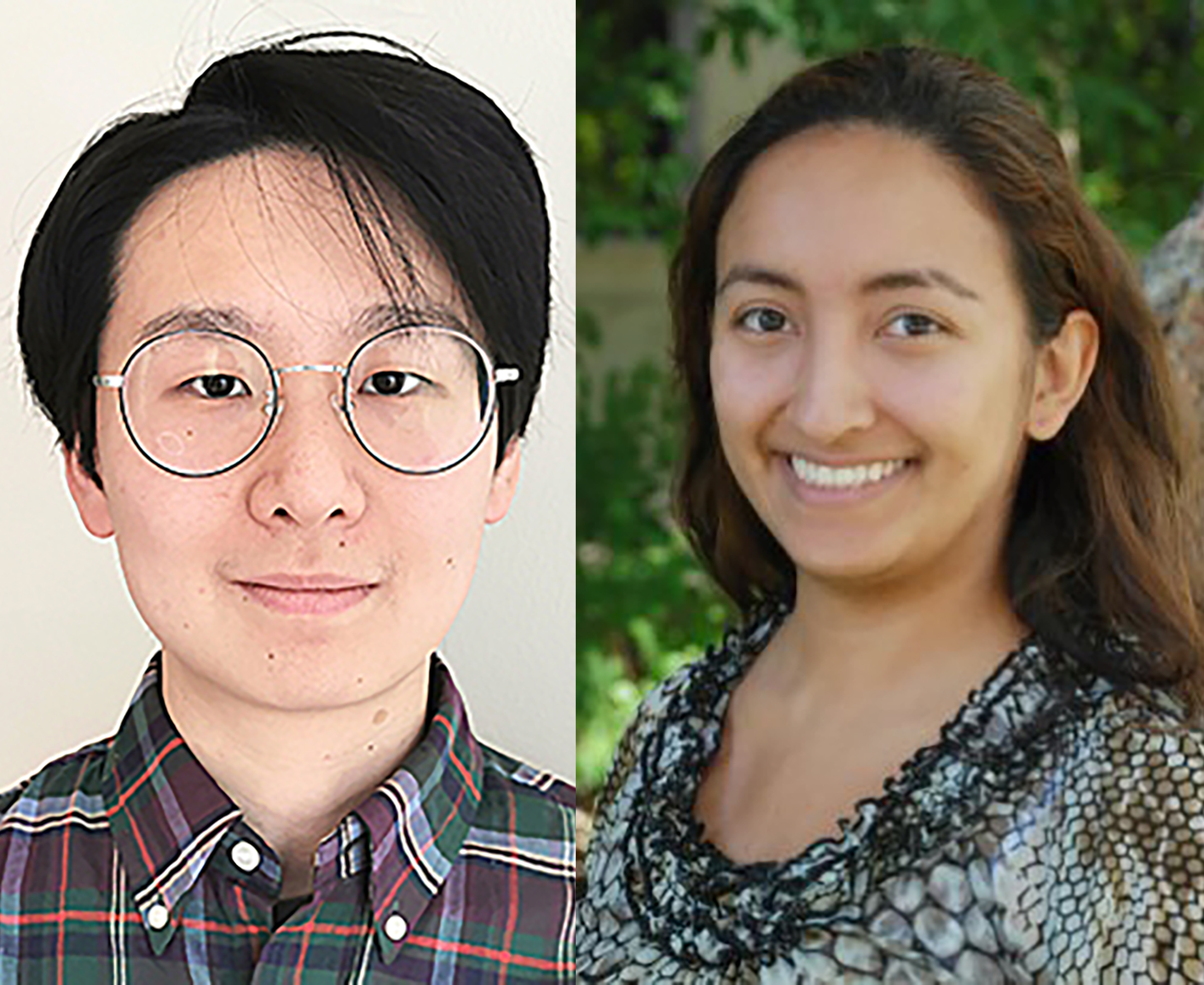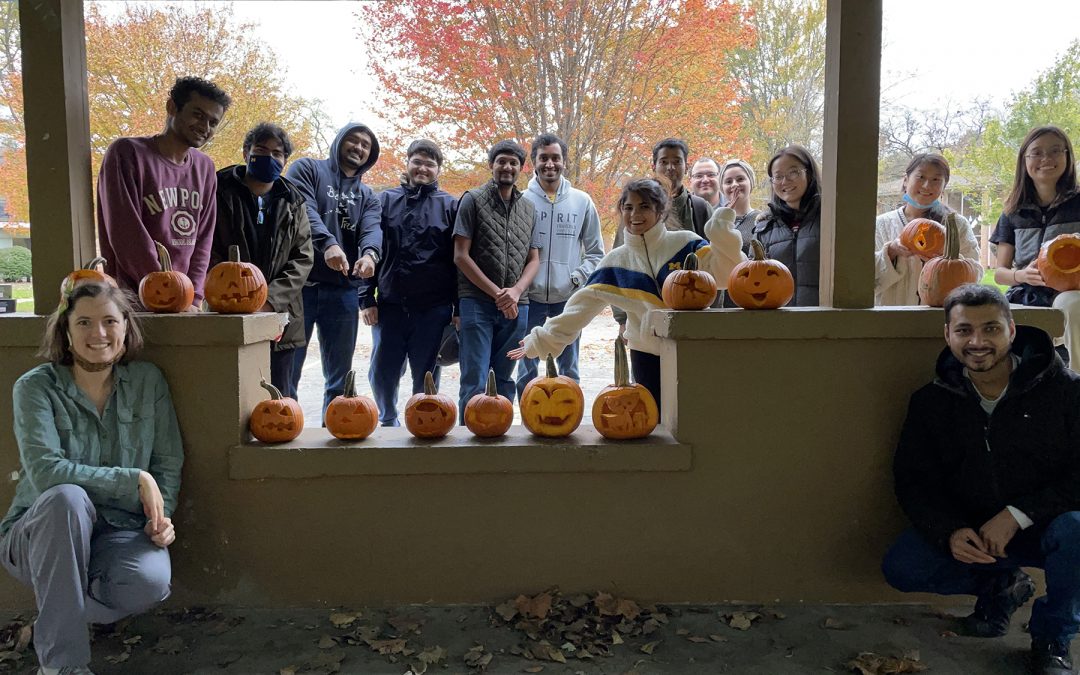Maria Mustafa, a Ph.D. candidate in earth and environmental sciences, studies the geochemistry of mineral deposits. Her research combines field geology with micro-scale lab work in order to better understand how elements and metals concentrate in the Earth’s crust—critical knowledge for both industries like mining and for the scientific understanding of Earth processes.
Yixuan Chen just completed her Ph.D. in chemical engineering, studying inorganic semiconducting materials with the goal of developing an improved multifunctional composite material with applications in energy conversion and electronic sensors.
Together, they served as co-presidents of Graduate Rackham International (GRIN), the Rackham student organization dedicated to supporting international graduate students at the University of Michigan.
Tell us about GRIN’s work.
MM: GRIN is a student organization sponsored by Rackham. We have an advisor within Rackham and get a yearly budget to do our programming. But beyond that, GRIN is a community. We strive for it to be a resource for international students to find comfort and to meet other international students through different events.
We strive to offer programming and resources for topics and initiatives usually not covered by classes, research, or mentoring with your advisor. Fortunately, we’ve developed a lot of collaborations with other student organizations and other points of access within the university, like the Rackham professional development team, the University Career Center, and Counseling and Psychological Services.

Organized by GRIN’s DEI team, Salsa and Bachata workshops introduce Latin dance to graduate students on campus. A success many graduate students reached out to GRIN requesting follow-up dance events in U-M community.
How did GRIN get started and who can join?
MM: It was the dream and idea of four or five graduate students who just saw the need of building this community at the university. GRIN was founded in 2016, but we’ve grown very fast, and that’s really encouraging.
GRIN is open for anyone to join—you don’t have to be an international student. We don’t close our doors to anyone, really, and we organize and foster events that are family friendly, too.
What does GRIN offer the graduate student community?
MM: We have teams dedicated to professional development, mentorship, DEI, and outreach.
For professional development, we have events that we do on a yearly basis. For example, we have a faculty panel in which we invite current faculty who were international students in the U.S. to talk about their experiences during that transition. That’s one of my favorite events to organize because it opens a space that’s difficult to have otherwise. We also offer programming for nonacademic professional and skills development. We partner with the career center to do transferable skill workshops and resume building, all tailored to international students and experiences, such as how to turn your international experience into a positive in an interview. We also do workshops on finance, like opening retirement accounts or starting to develop credit as a student. These are all necessary, but they’re rarely taught.
We usually start our mentorship program in the fall semester. We pair older international graduate students with new ones as mentors and mentees over the summer individually or in small groups, depending on the number of people involved. For individual mentorship, we give them a lot of freedom on how to develop that relationship, because every student has different questions. In group cases, we have preselected topics that each mentor will cover through the events that we host.
DEI encompasses many things, so it depends on what the most pressing issues are. We try to keep our DEI efforts following global issues. A couple years ago we had a lot of panels and lectures on anti-Asian racism when COVID-19 started. We’ve also had series of book clubs with respect to DEI issues, like women in STEM, immigrants and their stories, and other broader topics. The team also provides programming on what DEI is and the different initiatives around it.
Our outreach team runs a lot of events. During the summer, and whenever the weather is nice, we do a lot of outdoor events—from kayaking to outdoor picnics and barbecues to day hikes. Those are all free events. Then when it gets cold, we move to indoor events like board game nights or going to sporting events like Detroit Pistons games. Before COVID-19, we organized the International Gala, an event for fostering different cultural performances and food. People would dress up in formal outfits if they wanted, and we’d have food and live performances from different parts of the world. We partnered with other student organizations with cultural connections, like dance clubs or singing clubs that involved K-Pop, Irish dance, and Bollywood. We’re hoping to revamp that next year.
YC: Besides those, we also have a dedicated advocacy team. It focuses on the pressing issues faced by international students and tries to advocate for the rights and benefits of international students. For example, during the early stage of the pandemic, international students were challenged by unfair government policies. Our advocacy team, together with the whole GRIN executive board and advisor, allied with other international student groups in several universities and co-authored white papers to advocate for international students. We also meet with leadership from Rackham and the university, as well as representatives from congressional offices, to bring up the concerns we collect from our international community.

After long hours of virtual meetings during COVID-19, the GRIN board finally decided to meet in person and explore the nature around Ann Arbor. In collaboration with Adventure Leadership in April 2022, they hiked at Silver Lake in the Pinckney Recreation Area. A surprise April snowstorm made the day all the more fun and memorable.
Why is it important to have an organization like GRIN on campus?
YC: I feel it’s important to have an official group to represent international students, and to recognize them. They contribute a lot to the campus life and the university. More than 40 percent of Rackham students are international. I was here in 2015 before GRIN was founded, and most of the information needed by international students could only be found through other international students that you ran across. It was very limited. Having GRIN as a group, we can better organize that information and design help based on the needs of our international community.
MM: The university is very lucky to have an organization as big as GRIN. We hear of a lot of students who come from other institutions who’ve never heard of such a thing, and how happy they are to find something like GRIN that has a sense of community. We also do a good deal of advocacy. We advocate at the university, state, and federal level for international student rights and well-being. I think having that kind of support is completely necessary for international graduate students, who already deal with a lot of stress in their programs and then have these extra issues that aren’t fully experienced by other peers. It’s also great as a community to meet other students and just experience cultural and professional activities that you otherwise wouldn’t be able to.
What drew you to GRIN in the first place?
MM: I learned about GRIN early on in my U-M experience, at an orientation event, which I’m grateful for. I started coming to some of the events they organized and signed up for the mentorship program. I was matched with a senior student and she was very helpful in guiding me through all the processes and obstacles that international students have to figure out by themselves. She gave me a lot of support, and I don’t know what I would’ve done without that my first year. Things like getting a driver’s license. There are a lot of things about driving in the U.S. that are different and nobody tells you that in advance.
After that I wanted to be more involved and help students the same way I was helped. I started as an officer, our general position to support the other teams or take initiative on something yourself, then moved into the professional development team and was co-chair for almost three years. Then I moved into leadership.
YC: For me, one of the co-founders was in my department and she invited me to GRIN events, and I joined because I really enjoyed them and felt the sense of belonging. I joined in 2018 as an officer, then became a co-chair for mentorship and outreach and later decided to step up into leadership.
How does GRIN work with the other student organizations on campus?
MM: For big issues and events we usually collaborate with RSG [Rackham Student Government] and SCOR [Students of Color of Rackham]. One example is Graduate and Professional Student Appreciation Week. We collaborated with them to offer full programming, and to make sure we don’t step on each other’s toes by putting events at the same times. When we do advocacy, we also collaborate with RSG and SCOR. There’s a lot of communication between us and we try to maintain coordination between leadership teams.
YC: We also collaborate with other campus organizations, such as the African Students Association, Indian Student Association, and Postdoctoral Association. During COVID-19, to ensure safe arrival of international students to campus, we worked with Indian Student Association to fund rides from the airport to Ann Arbor. We also co-organized dance circles with the Postdoctoral Association. Usually, whenever we see a need from our community, we do our best to support it, and collaborating with other organizations is one of the best ways to do it.

Yixuan Chen (left) and Maria Mustafa (right), who stepped down as co-presidents of GRIN this year, are proud of the organization’s role and accomplishments on campus.
What would you like to see GRIN do in the near future?
YC: We have been always welcoming to both domestic and international students, but I think one important side of studying in the U.S. is getting to know domestic culture and students. I hope we can work to improve the interaction between the two groups.
MM: I would like to see more interaction between GRIN and other university organizations, to have a little more say in bigger decisions, have more ways of connecting with alumni, and being able to reach out more to the student community. I’d like to see GRIN reach out more to students in the professional schools or maybe who don’t go to the Rackham orientation events.
What have been GRIN’s biggest achievements recently?
YC: For me, it’s two sides. One side is socialization. Those events are the most attended, because people can find friends there, and we host both domestic and international students. I organized an event at the beginning of a fall semester and met a domestic student who went to Germany for studies and came back and was experiencing reverse culture shock on her return. From my perspective, GRIN is not only open to international students, but it also embraces all cultures and international experiences. Being able to socialize and meet people from diverse backgrounds is a very important part of students’ lives, especially graduate students who are often so busy.
The other side is in our advocacy efforts. We started about two years ago, especially during the previous administration. At that time, we formed our advocacy team and started talking to different university, state, and federal representatives to strive for the rights of international students.
MM: I’m very proud GRIN has been able to leverage its connections and recognition to advocate for students and really make an impact. For example, through the pandemic a lot of students were stranded in their home countries for a long time, having to teach or attend classes at odd times. We advocated for a lot of programming to be more accessible to people in different time zones or to be asynchronous.
I’m also proud of our recent efforts for fundraising during Giving Blueday. Our aim is to establish a seed grant for international students, because there’s a deficit of grants and scholarships they can apply for due to citizenship requirements, and we want to try to fill in that gap with these grants.
Learn more about GRIN and explore their upcoming events.

